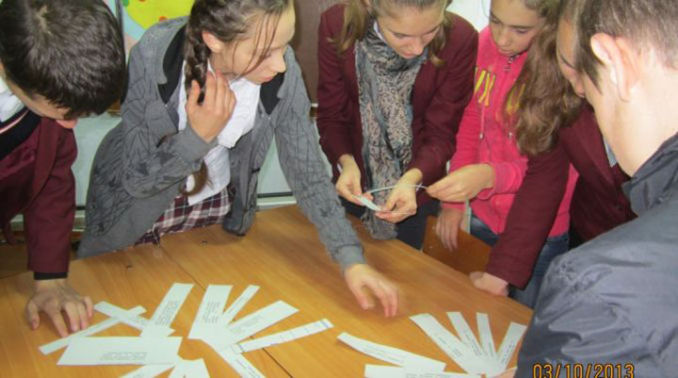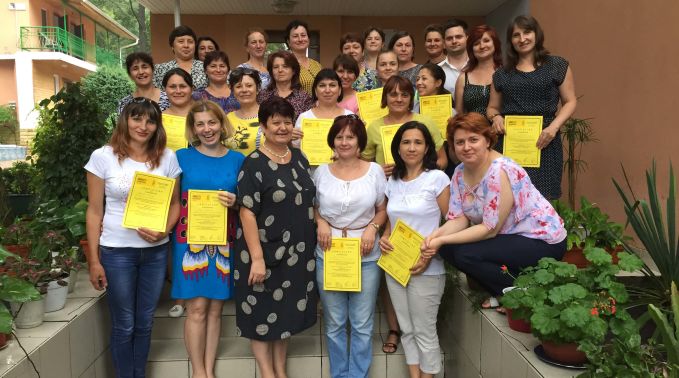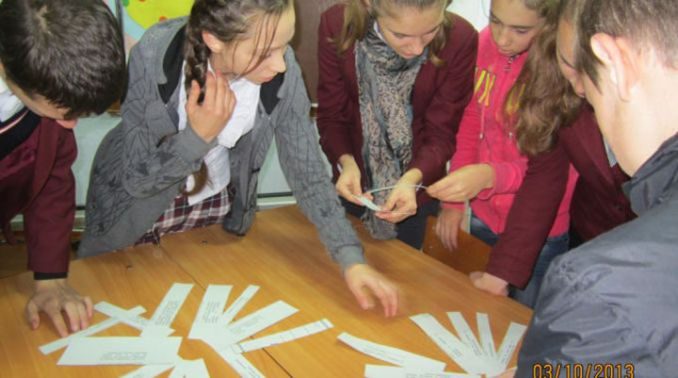Human rights is spreading across Moldovan classrooms in response to increasing demand from school students. Since the beginning of the school year, 2,000 students across the country have opted to study human rights, supported by Amnesty International’s initiative to make human rights education accessible across the country.
“People who do not know their rights will never know when they are violated. This is what I learnt during the first class, and the more I learn, the more powerful I feel,” said Dan, student at the Părpăuţi High School in Rezina, Moldova, after his first lesson on human rights.
Since September this year 2,000 secondary school students have been able to choose to follow the course entitled Education for Human Rights from a list of optional subjects across the country.
This is the first year that the subject, brought by Amnesty International Moldova, is integrated into the national curriculum.
So far 100 schools have started to offer the two-year course plan– the equivalent of 10% of Moldova’s total number of educational institutions.

Pavel Cerbusca, who teaches human rights education at the Academy of Sciences High School in Chișinău, believes the reason it’s so popular is because of the nature of the subject:
“Human rights education differs from other subjects because students learn elements that are necessary in life. It gives them more opportunities to be actively involved, to freely express their views, organize educational games and use interactive methods. In class, we also analyze real case studies that aim to prevent negative behaviours and victimisation. It’s important that we have this subject at school because it teaches students to develop critical thinking with the goal of encouraging young people to participate in their communities,” he says.
Once a week, Pavel’s students participate in the one-hour lesson where they are taught about human rights and topics such as the convention on the rights of the child, equality through diversity and sustainable development.
Human rights education differs from other subjects because students learn elements that are necessary in life. It gives them more opportunities to be actively involved, to freely express their views, organize educational games and use interactive methods.
Pavel Cerbusca, human rights education teacher
Daniel, a student at the Olimp High School in Sîngerei, reported that the course has helped him shape new views and opinions: “When I attended human rights classes, I found out that I used to have stereotypes, unfortunately. Now I know that all people are different but equal. People need to be tolerant and not discriminate against each other,” he says.
For Nicoleta who studies in the same school, taking the course helped her realise the ways she can defend human rights: “I have learnt that one man, one signature can change the world. People should all get involved and not be simple passers-by. I will use the skills I develop during class to defend those whose rights are violated and formulate my arguments”.
Making human rights education accessible across the whole country is a long-term goal for Amnesty International Moldova.
Prior to introducing the courses nationwide, the project was run with 600 students in 20 schools.
The Ministry of Education then approved a set of materials composed of a curriculum, a handbook and a teacher’s guide (available for download in Romanian and Russian).
“We wanted a curriculum that would be easy to implement in class. Teachers receive a complete package including steps, methods and print materials that serve as a starting point for the discussion, and we also provide them with training,” says Violeta Terguta, Human Rights Education Coordinator at Amnesty International Moldova.

Many schools and students were eager to take part in the first year of this initiative.
“Teaching human rights education at school is different from teaching a topic like history for instance. Moldova is a former Soviet country with only 25 years of independence, where until recently no one was talking about human rights, or from a human rights perspective,” she says.
“We were surprised with the high demand, but when we asked teachers the reasons for implementing this course, most of them told us this was the choice of their students.”
According to Amnesty Moldova, introducing human rights education at school not only reinforces students’ knowledge of their rights and responsibilities, but also contributes to them taking action to support human rights: countrywide about 98% of Write for Rights letters are signed by students in schools where the subject is taught.
For the next school year, Violeta and her team plan to introduce the course to 50 more schools and increase training opportunities for teachers, with the goal to soon reach 50% of Moldovan schools.


